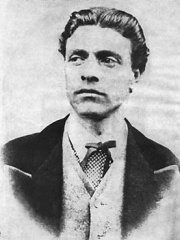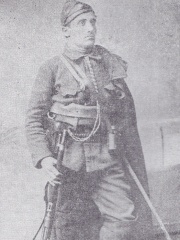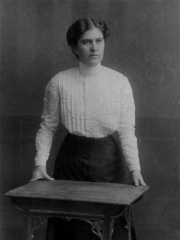



The Most Famous
SOCIAL ACTIVISTS from Bulgaria
This page contains a list of the greatest Bulgarian Social Activists. The pantheon dataset contains 840 Social Activists, 4 of which were born in Bulgaria. This makes Bulgaria the birth place of the 46th most number of Social Activists behind Australia, and Greece.
Top 4
The following people are considered by Pantheon to be the most legendary Bulgarian Social Activists of all time. This list of famous Bulgarian Social Activists is sorted by HPI (Historical Popularity Index), a metric that aggregates information on a biography's online popularity.

1. Vasil Levski (1837 - 1873)
With an HPI of 68.29, Vasil Levski is the most famous Bulgarian Social Activist. His biography has been translated into 47 different languages on wikipedia.
Vasil Levski (Bulgarian: Васил Левски, spelled in old Bulgarian orthography as Василъ Львскій, pronounced [vɐˈsiɫ ˈlɛfski]), born Vasil Ivanov Kunchev (Васил Иванов Кунчев; 18 July 1837 – 18 February 1873), was a Bulgarian revolutionary who is, today, a national hero of Bulgaria. Dubbed the Apostle of Freedom, Levski ideologised and strategised a revolutionary movement to liberate Bulgaria from Ottoman rule. Levski founded the Internal Revolutionary Organisation, and sought to foment a nationwide uprising through a network of secret regional committees. Born in the Sub-Balkan town of Karlovo to middle-class parents, Levski became an Orthodox monk before emigrating to join the two Bulgarian Legions in Serbia and other Bulgarian revolutionary groups. Abroad, he acquired the nickname Levski ("Lionlike"). After working as a teacher in Bulgarian lands, he propagated his views and developed the concept of his Bulgaria-based revolutionary organisation, an innovative idea that superseded the foreign-based detachment strategy of the past. In Romania, Levski helped institute the Bulgarian Revolutionary Central Committee, composed of Bulgarian expatriates. During his tours of Bulgaria, Levski established a wide network of insurrectionary committees. Ottoman authorities, however, captured him at an inn near Lovech and executed him by hanging in Sofia. Levski looked beyond the act of liberation and envisioned a Bulgarian republic of ethnic and religious equality, largely reflecting the liberal ideas of the French Revolution and contemporary Western society. He said, "We will be free in complete liberty where the Bulgarian lives: in Bulgaria, Thrace, Macedonia; people of whatever ethnicity live in this heaven of ours, they will be equal in rights to the Bulgarian in everything." Levski held that all religious and ethnic groups live in a free Bulgaria enjoy equal rights. He is commemorated with monuments in Bulgaria and Serbia, and numerous national institutions bear his name. In 2007, he topped a nationwide television poll as the all-time greatest Bulgarian.

2. Vlado Chernozemski (1897 - 1934)
With an HPI of 67.46, Vlado Chernozemski is the 2nd most famous Bulgarian Social Activist. His biography has been translated into 23 different languages.
Vlado Chernozemski (Bulgarian: Владо Черноземски; born Velichko Dimitrov Kerin, Bulgarian: Величко Димитров Керин; 19 October 1897 – 9 October 1934) was a Bulgarian revolutionary and assassin. He is also known as "Vlado the Chauffeur". Chernozemski began his revolutionary activities in 1922 when he joined the Internal Macedonian Revolutionary Organization (IMRO). Soon after, he became an assassin for the IMRO. He killed two notable Bulgarian politicians, communist Dimo Hadzhidimov, and IMRO member Naum Tomalevski. Both times he was sentenced to death, but he escaped from his first imprisonment and was released from the second. After his release in 1932, he became an instructor for the Ustaše. He trained a group of three Ustaše to assassinate Alexander of Yugoslavia, but eventually killed Alexander himself on 9 October 1934 in Marseille. He was then beaten by French police and spectators, and died the same day. French Foreign Minister Louis Barthou was also killed by a stray bullet fired by French police during the scuffle following the attack. Croat and Macedonian Bulgarian circles celebrated his act. For murdering King Alexander I, Chernozemski was posthumously declared the most dangerous terrorist in Europe. Chernozemski is considered a hero in Bulgaria. The official historiography in North Macedonia regards him as a controversial Bulgarian.

3. Dimitrana Ivanova (1881 - 1960)
With an HPI of 58.96, Dimitrana Ivanova is the 3rd most famous Bulgarian Social Activist. Her biography has been translated into 23 different languages.
Dimitrana Ivanova, née Petrova (Bulgarian: Димитрана Иванова, 1881–1960), was a Bulgarian educational reformer, suffragist and women's rights activist. She chaired the Bulgarian Women's Union from 1926 to 1944. She was a prominent figure in the early 20th-century movement for women's rights in Bulgaria. She campaigned for women's civil and political rights and was instrumental in advancing girls' education and women's involvement in public and professional spheres. As a journalist, she contributed to publications that advocated for women's rights and their empowerment in Bulgaria.

4. Ekaterina Karavelova (1860 - 1947)
With an HPI of 54.72, Ekaterina Karavelova is the 4th most famous Bulgarian Social Activist. Her biography has been translated into 20 different languages.
Ekaterina Karavelova (Bulgarian: Екатерина Каравелова), (21 October 1860 in Rouschuk – 1 April 1947 in Sofia), was a Bulgarian educator, translator, publicist, suffragist and women's rights activist.
People
Pantheon has 4 people classified as Bulgarian social activists born between 1837 and 1897. Of these 4, none of them are still alive today. The most famous deceased Bulgarian social activists include Vasil Levski, Vlado Chernozemski, and Dimitrana Ivanova.
Deceased Bulgarian Social Activists
Go to all RankingsVasil Levski
1837 - 1873
HPI: 68.29
Vlado Chernozemski
1897 - 1934
HPI: 67.46
Dimitrana Ivanova
1881 - 1960
HPI: 58.96
Ekaterina Karavelova
1860 - 1947
HPI: 54.72
Overlapping Lives
Which Social Activists were alive at the same time? This visualization shows the lifespans of the 3 most globally memorable Social Activists since 1700.

